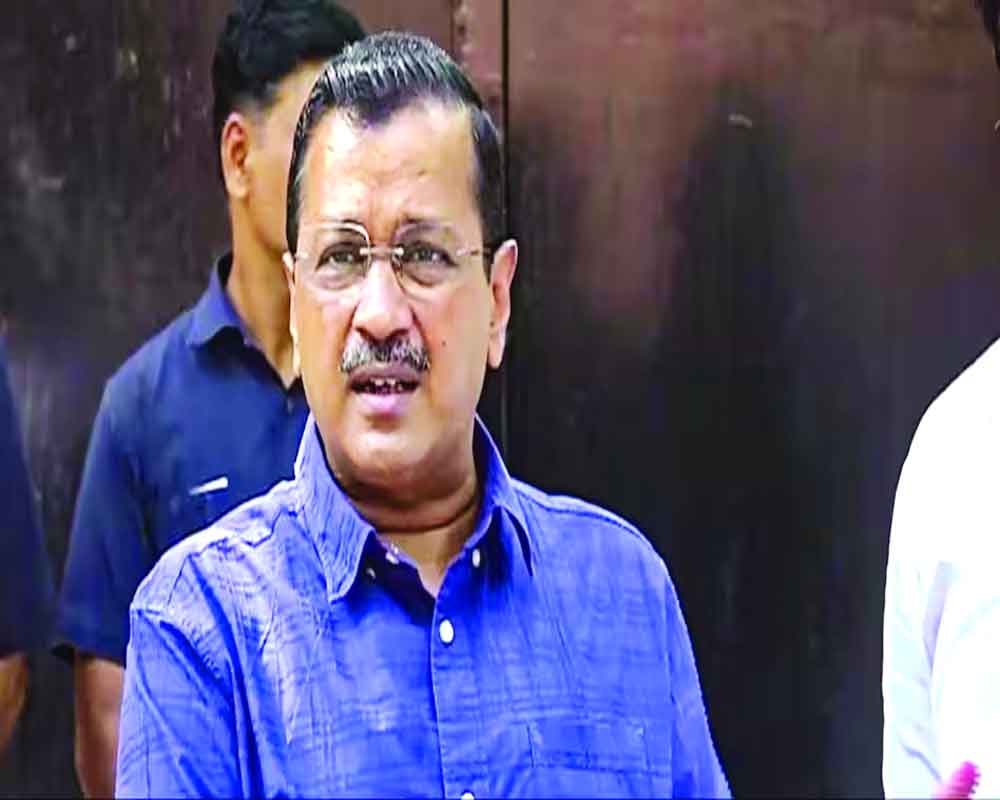In a blow to Delhi Chief Minister Arvind Kejriwal, the Delhi High Court on Tuesday stayed the trial court order granting him bail in the money-laundering case arising from the alleged excise scam, holding that the trial court failed to appreciate the material placed before it by the Enforcement Directorate and did not apply its mind while deciding the AAP leader’s bail plea.
The Court passed the order on a plea by the ED seeking stay of the trial court order passed on June 20 granting bail to Kejriwal.
A vacation bench of Justice Sudhir Kumar Jain said the ED’s contentions assailing the bail order required serious consideration. Kejriwal’s plea challenging the Delhi High Court’s stay order will come up for hearing on Wednesday in the Supreme Court.
“The Vacation Judge while passing the Impugned Order did not appropriately appreciate the material/documents submitted on record and pleas taken by ED and the averments/grounds as raised in the petition under section 439(2) of the code require serious consideration while dealing with said petition.
Accordingly, the present application is allowed and the operation of the Impugned Order is stayed. It is made clear that nothing in this order shall be taken as any opinion or observation on the merits of the petition under section 439 (2) of the Code,” the vacation judge said in the order.
Justice Jain said voluminous material cannot be considered is totally unjustified and it shows that the trial court has not applied its mind to the material.
In the 34-page order on the ED’s application seeking a stay on the operation of the bail order, Justice Jain asserted that every court is under an obligation to give sufficient opportunity to the parties to present their respective case and, in the instant case as well, the ED ought to have been given adequate opportunity to advance arguments on Kejriwal’s bail application.
Reacting to this, the AAP said it disagrees with the Delhi High Court order staying the bail granted to Kejriwal by the trial court and will challenge it in the Supreme Court. “They will approach the apex court,” the AAP said.
Justice Jain said the trial judge not only did not discuss and consider the arguments made by the anti-money laundering agency, including those advanced in the written submissions, it also did not discuss and record its view with respect to the “twin condition” requirement under section 45 of the Prevention of Money Laundering Act (PMLA) while granting bail.
Under section 45 of PMLA, an accused can be granted bail subject to the “twin conditions” that the court is prima facie satisfied that he is not guilty of such offence and the prosecutor has been given an opportunity to oppose the application for bail. The issue regarding Kejriwal’s vicarious liability as the head of the Aam Aadmi Party (AAM) also did not find any place in the bail order, the court added.
“The perusal of the Impugned Order is reflecting that the Vacation Judge has passed the Impugned Order without going through and appreciating the entire material brought on record by the rival parties which reflects perversity in Impugned Order. There is factual force in the arguments advanced by Sh. S. V. Raju (for ED) that the Vacation Judge has not passed the Impugned Order after due consideration of entire material on record,” the court opined.
Further, the High Court said that the finding of the trial court that there was malafides on ED’s part was incorrect since the High Court itself had in earlier order rejected such a claim by Kejriwal.
“Most important, the ASG referred to para 27 of the trial court order where the judge talks about mala fide by the ED. But this court is of the opinion that a coordinate bench of this court has said there was no mala fide on the part of the ED. Trial court should not have given any finding which is opposite to the finding of the High Court,” the single-judge underlined.
During the hearing, ASG SV Raju appearing for the ED, argued that the Impugned Order was passed on the basis of irrelevant consideration by ignoring relevant consideration. In the humble submission of this Court, these points are required to be considered by the Roster Bench at time of consideration of petition under section 439(2) of the Code.
The trial court had on June 20 granted bail to Kejriwal and ordered his release subject to bail bond of Rs 1 lakh. Special Judge (PC Act) Niyay Bindu of the Rouse Avenue Court said that ED failed to give any direct evidence linking Kejriwal to the proceeds of the crime and has also failed to show that another accused, Vijay Nair, was acting on Kejriwal’s behalf. While granting bail to Kejriwal, the trial court judge said,

















